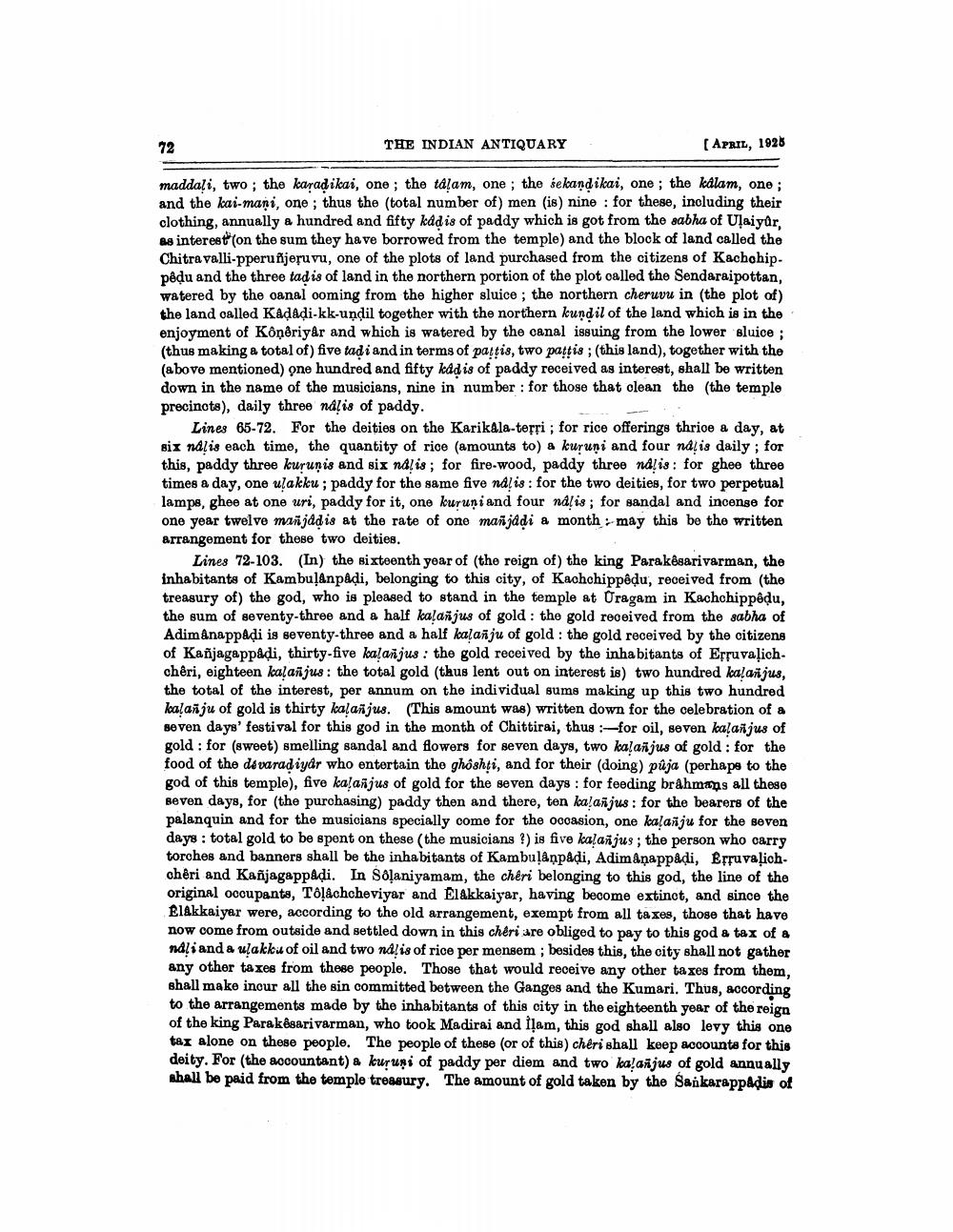________________
THE INDIAN ANTIQUARY
(APRIL, 1925
maddali, two; the karadikai, one; the talam, one; the sekandikai, one; the kalam, one ; and the kai-mani, one ; thus the (total number of) men (is) nine : for these, inoluding their clothing, annually a hundred and fifty kád is of paddy which is got from the sabha of Uļaiyur, as interest (on the sum they have borrowed from the temple) and the block of land called the Chitra valli-pperuñjeruvu, one of the plots of land purchased from the citizens of Kachohippêdu and the three tad is of land in the northern portion of the plot called the Sendaraipottan, watered by the oanal ooming from the higher sluice; the northern cheruvu in (the plot of) the land called Kadadi-kk-undil together with the northern kundil of the land which is in the enjoyment of Könêriyar and which is watered by the canal issuing from the lower sluice ; (thus making a total of) five tadi and in terms of pattis, two pattis ; (this land), together with the (above mentioned) one hundred and fifty kad is of paddy received as interest, shall be written down in the name of the musicians, nine in number: for those that clean the (the temple precinots), daily three nális of paddy.
Lines 65-72. For the deities on the Karikala-teffi ; for rice offerings thrice a day, at six nális each time, the quantity of rice (amounts to) a kuruni and four nd!is daily ; for this, paddy three kurunis and six nális ; for fire-wood, paddy three ndlis: for ghee three times a day, one ulakku; paddy for the same five ndlis: for the two deities, for two perpetual lamps, ghee at one uri, paddy for it, one kuruņiand four nális ; for sandal and incense for one year twelve manjad is at the rate of one manjadi a month -- may this be the written arrangement for these two deities.
Lines 72-103. (In) the sixteenth year of the reign of) the king Parakesarivarman, the inhabitants of KambuļAnpadi, belonging to this city, of Kachchippôdu, received from the treasury of) the god, who is pleased to stand in the temple at Uragam in Kachchippôdu, the sum of seventy-three and a half kalanjus of gold : the gold received from the sabha of Adimanappadi is seventy-three and a half kalanju of gold : the gold received by the citizens of Kañjagappadi, thirty-five kalanjus : the gold received by the inhabitants of Erruvalichchêri, eighteen kalasjus: the total gold (thus lent out on interest is) two hundred kalan jus. the total of the interest, per annum on the individual sums making up this two hundred kalaiju of gold is thirty kalanjus. (This amount was) written down for the celebration of a seven days' festival for this god in the month of Chittirai, thus :--for oil, seven kalasjus of gold : for (sweet) smelling sandal and flowers for seven days, two ka!aijus of gold: for the food of the devaradiyar who entertain the ghoshti, and for their (doing) půja (perhaps to the god of this temple), five kalajus of gold for the seven days : for feeding brahmans all these seven days, for the purchasing) paddy then and there, ten ka! anjus : for the bearers of the palanquin and for the musicians specially come for the occasion, one kalañju for the seven days : total gold to be spent on these (the musicians ?) is five kalanjus; the person who carry torches and banners shall be the inhabitants of Kambulanpadi, Adimanappadi, Erruvaļich. cheri and Kañagappadi. In Solaniyamam, the chêri belonging to this god, the line of the original occupants, Tolachcheviyar and Elakkaiyar, having become extinct, and since the Elakkaiyar were, according to the old arrangement, exempt from all taxes, those that have now come from outside and settled down in this chéri are obliged to pay to this god a tax of a nali anda ulakku of oil and two nd! is of rice per mensem ; besides this, the city shall not gather any other taxes from these people. Those that would receive any other taxes from them, shall make incur all the sin committed between the Ganges and the Kumari. Thus, according to the arrangements made by the inhabitants of this city in the eighteenth year of the reign of the king Parakesari varman, who took Madirai and llam, this god shall also levy this one tax alone on these people. The people of these (or of this chéri shall keep accounts for this deity. For the accountant) a kuruni of paddy per diem and two ka! anjus of gold annually shall be paid from the temple treasury. The amount of gold taken by the Sankarappadis of




